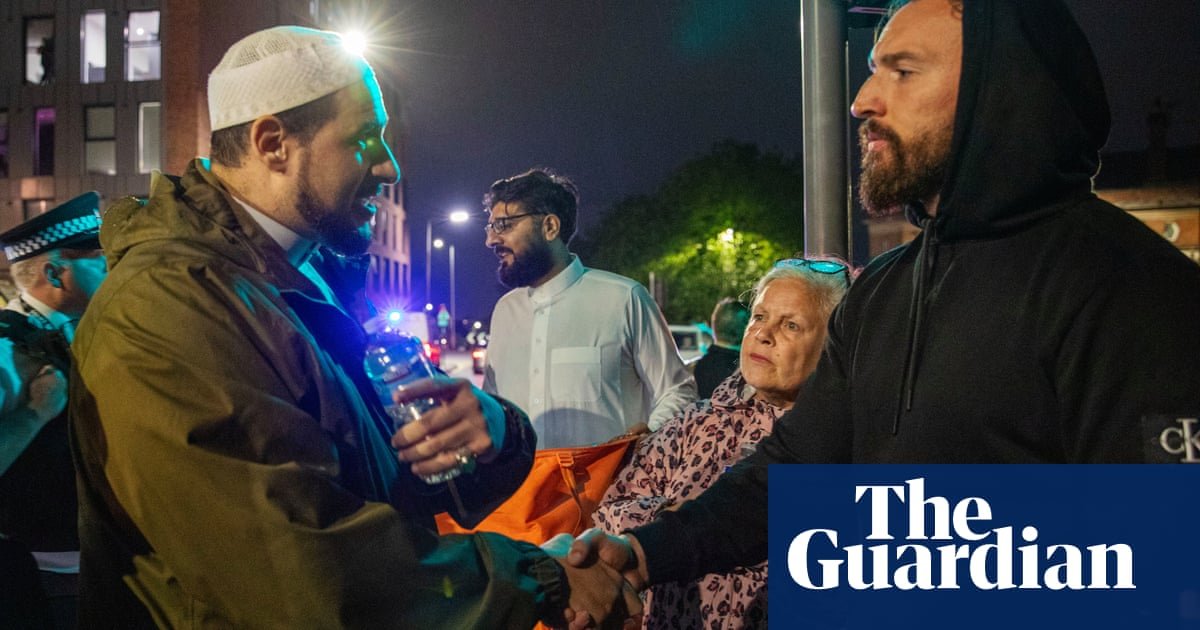It was to be one of the first major demonstrations by the far right this weekend and fears were high of a violent outburst posing a danger to communities.
On one side of the road, with their backs to the mosque, was a diverse group of about 200 anti-fascists – equal numbers men and women and a mixture of ages, from students to retirees, including one woman with a “Nans against Nazis” placard.
On the other, facing the mosque, were a bunch of mostly white men, about 30 in number at their peak. Between them, in the road, officers from Merseyside and nearby North Wales forces kept the groups apart, some wearing fireproof clothing, with batons and helmets strapped to their waist. Half a dozen police cars and vans blocked either end.
Police had feared a serious disturbance when a flyer was circulated in far-right groups calling for a demonstration outside Abdullah Quilliam Society Mosque on West Derby Road in Liverpool on Friday night. It followed riots outside a mosque in Southport on Tuesday night, during which police were pelted with bricks, a police van was torched and property walls and the road were damaged.
The violence was triggered by the fatal stabbing of three girls in the town, Alice Dasilva Aguiar, nine, Bebe King, six, and Elsie Dot Stancombe, seven, while attending a Taylor Swift-inspired dance class on Monday. Despite official information to the contrary, many rioters chose to believe lies spread on social media that the 17-year-old alleged perpetrator was an undocumented immigrant.
Early on Friday evening, a couple of men appeared to film the anti-racist group gathered outside the mosque in Liverpool. “He’ll be a scout for the far right,” said one seasoned anti-fascist about a lone middle-aged man in a sports top who disappeared as quickly as he had arrived. “Once they see us lot on video, they won’t bother leaving the pub.”
His predictions were broadly right. An early scuffle occurred when a far-right protester was goaded to cross the road by the anti-fascists, who sang: “There are many, many more of us than you” to the tune of the folk song She’ll Be Coming Round the Mountain. But after some aggression directed at a young Asian woman, police pulled the middle-aged white man back to his side of the road.
One woman, Rebecca, who held a “No room for racism” banner, said there was something about the character of the people of Liverpool that meant the far right rarely managed to cause more than a slight nuisance to people in the city.
“Liverpool is a place that comes together as a community,” she said. “We’re a very socialist city and we have no room for any sort of unreasoned bias where we’re singling out one ethnic group over another at the end of the day.”
Later in the evening, some members of each group began to talk.
“What is the definition of right wing?” asked Lee, originally from London who had come because of concerns about immigration. “Doctors, nurses, teachers, we need to embrace them, we need them, chefs, let them come in. But when you have people coming on small boats, mostly males …”
Scarlett, a young Asian woman asked him: “I agree that you can protest about the boats, but what has that got to do with the young girls in Southport? How is it related?”
Lee admitted: “Maybe it’s not related.”
At about 10pm, the imam, Adam Kelwick, crossed the road to hand out burgers and talk to those left about why they had gathered outside the mosque.
Some of them refused to engage in earnest but Don Cornell, originally from Glasgow but living in Liverpool, had a long conversation with Kelwick.
after newsletter promotion
“That’s a fair point,” said Cornell, after Kelwick said the Muslim community shared the same concerns as him about extremism and grooming gangs, two of the far right’s favourite issues.
Kelwick said: “When things have calmed down a bit, we’re going to arrange a forum and we want genuine people like you to come in, and we’ll listen to each other, talk about the issues. But you’ve got to be ready to step up and talk.”
Cornell agreed and the conversation ended in a hug.
Friday night in Liverpool may have been a scene of uneasy peace but on the opposite English coast in Sunderland, a far-right riot led to a police station being set alight.
With more than a dozen far-right protests organised across the UK on Saturday, police and communities will be hoping they resemble Liverpool, though early indications show any such optimism may be misplaced.
Qari Asim, the chair of the Mosques and Imams National Advisory Board and an imam at Makkah Mosque in Leeds, said Muslims were “deeply worried and anxious” about the nature of the planned demonstrations.
He said he had been visiting mosques to encourage worshippers “to stay vigilant and calm, and ensure that adequate security measures are in place”.
Many Muslims were afraid to walk alone to their local mosque for Friday prayers, feeling as though people on the far right were “out to get us”,one imam said. In Southport, at the mosque that was the scene of Tuesday’s riots, attendance was down and worshippers kept their children at home when they went for lunchtime prayers on Friday.
Asim said he wanted to thank the police, who had “shown remarkable courage whilst under constant and sustained attack from racist thugs”.
He said: “The support and friendship offered by people of other faiths and beliefs has been heartening. Many non-Muslims visiting mosques to show solidarity or making a human chain outside a mosque to protect it from damage, is what makes Britain so special, and reminds us that only by coming together, can we defeat hatred and extremism. Love will prevail over hatred.”
